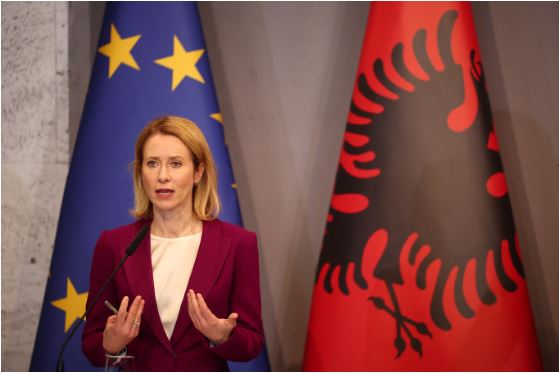TIRANA — In a visit underscored by both symbolic weight and geopolitical strategy, Kaja Kallas, the European Union’s High Representative for Foreign Affairs, delivered a clear and decisive message: Europe is within reach, but only for those prepared to meet its demanding standards. “There is no shortcut, Kallas told Albanian leaders. “Only reforms will open the door.”
As the EU grapples with mounting geopolitical challenges and shifting global alliances, Kallas’s visit not only reinforced Europe’s commitment to the Western Balkans but also illuminated the road ahead – one marked by rigorous reforms, particularly in the fight against corruption. This visit forms part of a broader diplomatic tour across the region, signalling Europe’s deepened engagement with the Balkans and its pivotal role in shaping the region`s future stability and alignment.
Her words were a blunt dismissal of any illusions that Albania might bypass the painstaking reforms required for EU accession. Kallas emphasized that EU membership is not an entitlement, but a process that demands deep, systemic change in areas like rule of law, corruption control, and institutional modernization. The timing of her visit added an extra layer of political significance.
With Albania’s local elections looming just weeks away, Prime Minister Edi Rama framed the vote as a referendum on Albania’s European future. ``No one can stop us,“; Rama declared. On May 11, we’ll get the result we need. The message was clear: his government is the one steering Albania toward the EU. However, Kallas offered a subtle counterpoint. “This journey requires cooperation from all political forces,” she said, stressing that Europe is watching not just the actions of governments, but the broader political landscape. She warned that reforms, particularly those tackling corruption, demand broad societal backing – not just government decrees. “Difficult reforms need broad, sustained support,” Kallas added, reminding Rama that Brussels is closely monitoring the domestic political climate.
The visit was not just about integration; it was about security. In a region rattled by
the aftershocks of Russia’s invasion of Ukraine, Albania is increasingly viewed as a strategic partner for the EU. The formal launch of the EU – Albania Strategic Security and Defence Dialogue reinforced Albania`s growing role in Europe’s security framework, focusing on issues like cybersecurity, hybrid threats, and military preparedness. “This isn’t just about enlargement,” one EU official remarked. “It’s about anchoring Albania to the European project.”
To underscore this partnership, Kallas also oversaw the signing of a €90 million EU financial package for the Durrës – Rrogozhinë railway project. This vital infrastructure investment is more than just a transport link; it symbolizes Albania`s gradual integration into the EU’s economic and political orbit. By connecting Albania to Corridor VIII, a critical transport artery in the Balkans, the project marks a concrete step toward Albania’s EU future.
Still, the road ahead remains challenging. Albania opened its first negotiating chapters in 2024, with the ambitious goal of closing them by 2027. But Brussels will not be satisfied with superficial progress. The EU is scrutinizing the implementation of laws, their enforcement in courts, and their impact on entrenched political and economic elites.
The real test for Albania, however, is not technical – it’s political. At a public event with students from the College of Europe and the University of Tirana, Kallas was asked about the generational shift required for Albania to fully align with European values. “We see you as allies“, she told the students, “Your future is European—but it must be earned.”
The EU’s position is clear: Albania has declared its ambition; Europe has responded with conditional support. What remains is the unglamorous work of becoming the kind of country that no longer has to ask for a seat at the table – because it already thinks, acts, and governs like it belongs there. As Kallas put it in her closing words: “The EU is not a finish line. It’s a family. And to join a family, you don’t just arrive – you earn your place.”
Written by our correspondent A.T.



